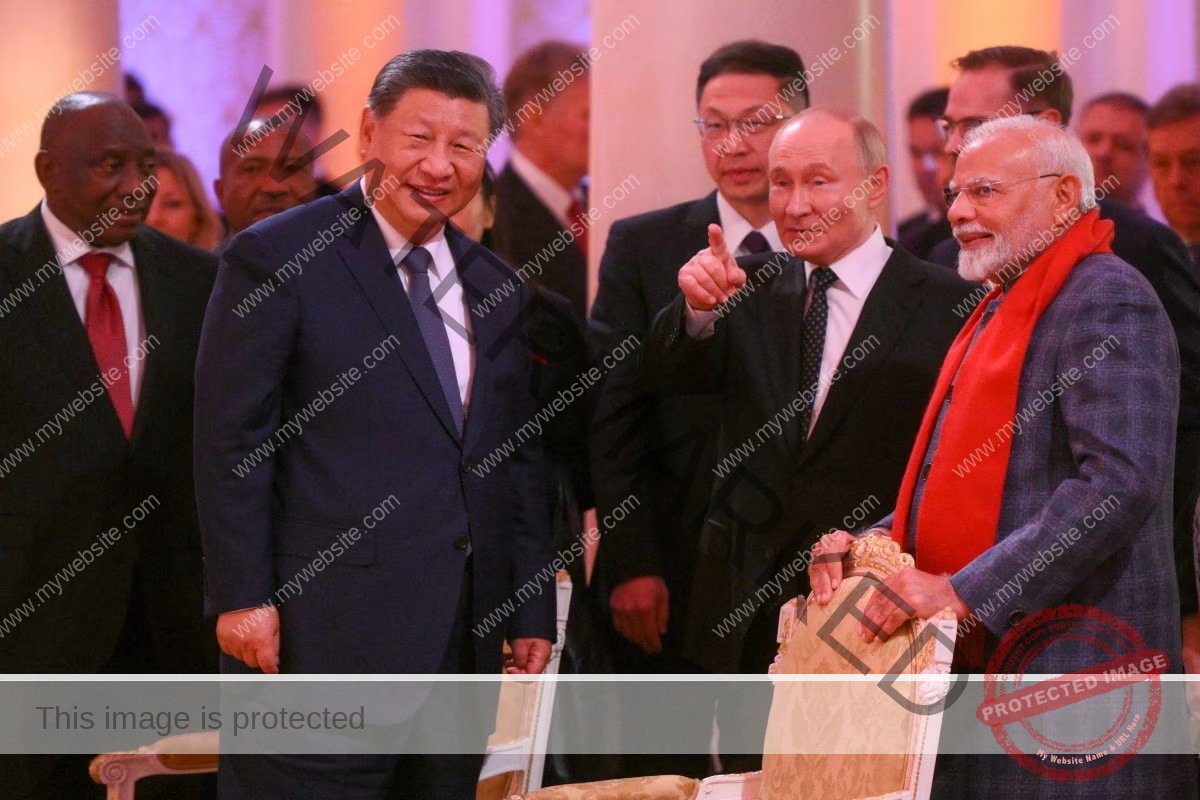GEW Intelligence Unit
The Expansion of BRICS: New Members and Strategic Alliances
The enlargement of BRICS in 2024 heralds a transformative epoch in the geopolitical tableau, as the admittance of new members and the forging of strategic alliances significantly enhance its clout on the international stage. This phenomenon arises from the consortium’s unwavering commitment to fortifying economic cooperation and nurturing a multipolar world order that contests the predominance of Western powers. By integrating nations with variegated economic portfolios and distinct geopolitical ambitions, BRICS endeavors to establish a confederation that mirrors the evolving power dynamics globally.
The assimilation of additional members into BRICS is anticipated to act as a catalyst for economic collaboration across an array of sectors, encompassing trade, technological advancement, and infrastructure development. This expansion amplifies the group’s collective bargaining authority, empowering it to engage more adeptly with Western powers on pivotal issues such as trade negotiations, climate policies, and reforms in financial regulation. As BRICS embraces a broader spectrum of perspectives and capabilities, it fortifies its stature as a formidable counterweight to Western-dominated institutions.
Furthermore, these strategic alliances are poised to stimulate investment flows and engender the exchange of knowledge among member nations, culminating in a resilient network of partnerships that propel sustainable development. By cultivating unity and shared objectives, BRICS actively contests the prevailing global order, potentially redirecting economic gravity towards the East and South. This augmentation signifies not merely a challenge, but also an opportunity for the West to interact with a swiftly morphing geopolitical environment.
Economic Growth and Investment Opportunities within BRICS
The BRICS consortium, comprising Brazil, Russia, India, China, and South Africa, constitutes a formidable entity in the global economic landscape, particularly as these nations continue to unveil significant growth trajectories and investment prospects leading into 2024. As emergent markets, the BRICS nations collectively represent a considerable fraction of the world’s populace and are anticipated to increasingly contribute to global GDP. This surge is catalyzed by diverse factors, including expansive consumer markets, ample natural resources, and burgeoning industrial bases.
Each member state contributes distinct advantages: Brazil’s agricultural exports, Russia’s energy reserves, India’s burgeoning technology and service sectors, China’s manufacturing capabilities, and South Africa’s mineral wealth.
Investment prospects flourish within these economies, propelled by both internal and external drivers. Foreign Direct Investment (FDI) is expected to ascend, particularly within sectors such as infrastructure, technology, and renewable energy, in alignment with global imperatives for sustainable development. As these nations prioritize enhancing intra-BRICS trade through strategic collaborations and the dismantling of trade barriers, foreign investors discover appealing opportunities, characterized by relatively lower entry costs and promising returns.
Moreover, the shift towards greater economic integration and the establishment of alternatives to Western-hegemonic financial systems, exemplified by the New Development Bank, challenges the conventional economic powers, proffering diversified financial instruments. As BRICS continues to exploit its growth potential, it unveils an increasingly attractive landscape for global investors seeking new avenues beyond Western markets.
BRICS and the Shift in Global Financial Power Dynamics
The BRICS consortium, composed of Brazil, Russia, India, China, and South Africa, symbolizes a profound transformation in global financial power dynamics as these nations assert their economic influence on the world stage. Collectively, they have made significant contributions to global growth, with their GDPs constituting a substantial portion of the world’s economic output. The impending expansion of BRICS in 2024 possesses the propensity to exacerbate this shift, challenging the historic supremacy of Western economies.
One pivotal aspect of this transformation is the initiative among BRICS countries to establish alternative financial institutions, such as the New Development Bank (NDB). This endeavor denotes a critical movement towards creating financial frameworks less reliant on Western-centric infrastructures, thereby granting them a platform to execute economic policies that resonate with their developmental objectives. Such a shift not only fortifies their autonomy but also enables them to embark on cross-border projects with enhanced independence.
Furthermore, the escalating economic influence of BRICS nations empowers them to negotiate trade and investment agreements under more favorable conditions. The proliferation of bilateral trade agreements within the bloc and with other emerging markets underscores their intention to solidify economic ties independent of Western oversight. As these dynamics unfold, traditional financial power structures confront mounting challenges, with BRICS at the forefront of fostering a multipolar world order in international finance, thereby recalibrating global interactions and dependencies.
Technological Collaboration: BRICS Versus Western Innovation Hubs
In the rapidly evolving global milieu, technological collaboration among BRICS nations emerges as a salient counterbalance to the entrenched innovation hubs of the West. As BRICS countries—Brazil, Russia, India, China, and South Africa—endeavor to augment their technological capabilities, they encounter both opportunities and challenges in vying against Western preeminence. Each BRICS nation offers distinctive strengths: India’s thriving IT sector, China’s manufacturing and technological acumen, and Russia’s prowess in scientific inquiry.
However, these nations also contend with heterogeneous technological proficiencies, regulatory frameworks, and varying levels of investment in research and development.
Collaboration within BRICS is increasingly oriented towards harnessing these individual strengths to foster a synergistic effect. Noteworthy partnerships in artificial intelligence, renewable energy, and biotechnology exemplify a heightened commitment to challenging Western innovation. Additionally, leveraging technology as a medium for economic empowerment and infrastructure enhancement remains central to BRICS’ strategic agenda. In spite of this push, internal geopolitical and economic disparities present formidable barriers to seamless cooperation.
In contrast, Western innovation hubs, typified by Silicon Valley’s burgeoning startups and Europe’s prestigious research institutions, benefit from relatively cohesive policies and abundant capital investments. Nonetheless, the ascent of BRICS in technological arenas injects competitive pressure and posits an alternative innovation paradigm that could inspire shifts in global technological paradigms.
Political Influence: BRICS’ Role in Shaping Global Governance
In recent years, BRICS has increasingly established itself as a consequential force in global governance, directly challenging the historically Western-centric international order. The bloc, comprising Brazil, Russia, India, China, and South Africa, embodies a confluence of diverse political systems and economic aspirations that present a viable alternative to Western hegemony. As these nations solidify their economic and political footing, BRICS is poised to exert substantial influence over the contours of global governance.
BRICS’ political clout is manifest in its concerted endeavors to reform international financial institutions, such as the International Monetary Fund and the World Bank, to better encapsulate the emergent global multipolarity. The creation of the New Development Bank and the Contingent Reserve Arrangement underscores their commitment to enhancing economic resilience and supporting developmental initiatives without relinquishing reliance on Western institutions. Furthermore, BRICS countries advocate for a multipolar international framework, promoting greater inclusivity and representation in decision-making processes at multilateral venues, such as the United Nations.
The bloc’s cooperative approach to political and economic challenges subverts the Western narrative by espousing principles of sovereignty, non-interference, and mutual benefit. This ethos resonates compellingly with numerous developing nations, who perceive BRICS as a platform for fostering a more equitable global governance structure. As BRICS continues to solidify its influence, it engenders both competitive and complementary dynamics relative to Western interests, illuminating the necessity for innovative strategies in global collaboration and dialogue.
The West’s Response: Adaptation or Opposition to BRICS 2024?
The West’s reaction to the evolution of BRICS in 2024 could manifest as a nuanced interplay of adaptation and resistance. On one hand, Western nations may seek to recalibrate their strategies by enhancing their collaborative frameworks, fortifying alliances such as NATO and the G7, and cementing economic relations with emerging markets that do not align with BRICS. This proactive adaptation might involve embracing technological innovations, investing in green technologies, and advancing inclusive economic policies to sustain global influence and competitiveness.
Conversely, elements of opposition may emerge, characterized by measures designed to counterbalance BRICS’ ascendant geopolitical stature. Such strategies could encompass economic interventions like trade policies aimed at constraining BRICS’ sway, or political initiatives intended to propagate Western norms and values within emerging regions. Diplomatic strategies may also focus on reinforcing bonds with non-BRICS entities to establish a counterweight to BRICS’ initiatives.
The West may engage in framing narratives that depict its model of governance and economic development as more advantageous and sustainable compared to that of BRICS. Nonetheless, the chosen trajectory will likely be informed by pragmatic considerations, as Western nations increasingly recognize the imperative of collaborating with BRICS members on critical global issues such as climate change, security, and economic stability. The conundrum remains in finding a viable equilibrium between cooperation and competition within an evolving global order.

